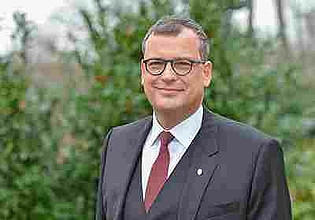News | Wednesday, 11 December 2019
Gerald Haug elected President of the Leopoldina

Picture: Markus Scholz for the Leopoldina
Gerald Haug is the new president of the German National Academy of Sciences Leopoldina. He was elected in a secret written vote taken by the Leopoldina Senate. On 1 March 2020 this renowned climatologist will take over the position from Jörg Hacker. The microbiologist Hacker directed the academy since 2010 and is now retiring as scheduled after two terms. Haug (born 1968) will be the XXVII Leopoldina president. He is a Director at the Max Planck Institute for Chemistry in Mainz as well as a professor at the Swiss Federal Institute of Technology (ETH) Zurich/Switzerland. The handover ceremony will take place on Thursday, 20 February 2020.
“Gerald Haug has an uncanny faculty for communicating scientific topics to policy makers and the society at large. Moreover, he is actively involved with a wide variety of national and international scientific networks. These attributes make him particularly well suited to lead the Leopoldina in its role as a national academy with its mandate to provide science-based advice for political and social institutions and to maintain its worldwide affiliations with other science academies,” observed Leopoldina President Jörg Hacker about his successor. “In choosing Gerald Haug to head the Academy, the Senate has elected a scientist who early on gained recognition for his excellent research,” added Hacker.
Gerald Haug had this to say after his election: “I would like to build on the successful work of Jörg Hacker in his ten-year tenure as President of the Academy. As the National Academy of Sciences, the Leopoldina has great potential to actively and effectively influence and support the formation of opinions about political and societal issues.” Haug looks to focus on “fact-based, balanced and transparent scientific advice that takes the interests of all the different social groups into account. Leopoldina can thus make an important contribution to the consensus on current issues and future topics, a task that is becoming increasingly important in our fast-changing and ever more complex world – on the national, European and worldwide level.”
Gerald Haug became a member of Leopoldina´s Earth Sciences section in 2012. In his role as an elected representative for this section, he has been a member of the Senate of the Academy since 2015. In 2016 he was elected by the Senators from each of the sections in Class I, which includes the disciplines falling under the headings “mathematics, natural sciences and engineering”, to be the spokesperson for the entire Class I. He collaborated on numerous publications dealing with science-based political advice, most recently as one of two speakers for the “Climate targets 2030: Towards a sustainable reduction of CO2 emissions (2019)” working group. In 2015 Haug was the co-author of the position statement regarding the future of the oceans, which was prepared by the G7 science academies in preparation for the Elmau summit and handed over to the heads of state and governments of the G7 nations.
Gerald Haug is a climatologist, geologist and paleo-oceanographer. He studied the development of the climate over the last thousands, as well as millions of years. In the process, he examined sediment cores, which are drilled up from beneath the floors of oceans and lakes. The chemical composition of the different sediment layers provides clues to the prevailing climatic conditions at the time the respective layers were deposited. It is thus possible for scientists like Gerald Haug to reconstruct historic climate conditions and their development over time. In addition, Haug studied the interactions between climate and cultures. By investigating core samples from off the coast of Venezuela he was able to find evidence of historical periods of drought that correlated in time with the fall of the Mayan civilization. Haug also found clues to the impact of climate change on historical developments in other regions, such as a relationship between times of weakened monsoons and the demise of several Chinese dynasties.
Gerald Haug studied geology in Karlsruhe. For his doctorate he moved to the University of Kiel, where in 1995 he received his PhD. He then worked as a postdoctoral fellow at the University of British Columbia in Vancouver, Canada and at the Woods Hole Oceanographic Institution, USA. In 1998 he spent two years as a Research Assistant Professor at the University of Southern California in Los Angeles, USA. At the start of the 2000s he became an assistant professor at the Swiss Federal Institute of Technology (ETH) in Zurich, where he habilitated in 2002. In 2003 he took over the post of section head at the Geo Research Center in Potsdam and was appointed professor at the University of Potsdam. In 2007 he was appointed full professor at ETH Zurich. Since 2015 he has been Director of the Department of Climate Geochemistry at the Max Planck Institute for Chemistry in Mainz and a Scientific Member of the Max Planck Society. Haug will maintain his position at the Max Planck Institute in a part-time capacity.
